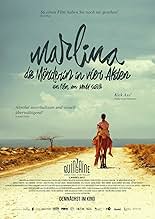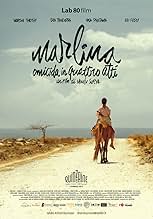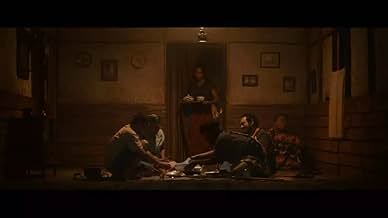AVALIAÇÃO DA IMDb
6,9/10
3,6 mil
SUA AVALIAÇÃO
Adicionar um enredo no seu idiomaMarlina lives quietly in Sumba until one day a man named Markus and his gang try to rob her house and she kills him. Eventually, she is haunted by Markus, and her life turns in 180 degrees.Marlina lives quietly in Sumba until one day a man named Markus and his gang try to rob her house and she kills him. Eventually, she is haunted by Markus, and her life turns in 180 degrees.Marlina lives quietly in Sumba until one day a man named Markus and his gang try to rob her house and she kills him. Eventually, she is haunted by Markus, and her life turns in 180 degrees.
- Direção
- Roteiristas
- Artistas
- Prêmios
- 27 vitórias e 41 indicações no total
Yayu A.W. Unru
- Raja
- (as Yayu Unru)
Ruly Lubis
- Don
- (as Ruli Lubis)
- Direção
- Roteiristas
- Elenco e equipe completos
- Produção, bilheteria e muito mais no IMDbPro
Avaliações em destaque
A indonesian rape/revenge movie in four parts. The males are mindless thugs, and early on you realize marlina is not a push over. The movie is pretty slow moving but as its set in rural indonesia, it reflects the isolation of how it is in those island areas. The policemen scene, pretty much sums up how you deal with indonesian bureauracy in real life. The cinematography is majestic and with accompanying music remind me of 70s spaghetti westerns, in some scenes even felt there were hints of tarantino. Overall, slow paced watchable movie.
This is not movie about forgiveness. The fusion between folk indonesia east and western is very brilliant. The moving picture, the story, the plot is so dark yet beautiful. In remote place in developing country there are so many women like marlina surviving and struggling.
This movie is about women empowerment !!
Marlina (Marsha Timothy) is a young woman living on a farm in rural Indonesia. As news spreads that she is recently widowed, a gang of seven bandits arrive at her home with the intention of robbing and raping her. Her predicament and its aftermath lead her to meet other interesting characters including Novi (Dea Penendra) who is in a late stage of pregnancy and experiencing marital problems.
Director Mouly Surya (who wrote the film with Rama Adi) seems to be influenced by Quentin Tarantino though, thankfully, with much less violence and darkness. This film has a bizarre mix of humour with conflict and tragedy. Like Tarantino, Surya succeeds in creating a film that is unique, thrilling, and eccentric. Timothy is good as unlikely hero; her sarcastic glances are hilarious. And the stunning photography of beautiful landscapes was truly a treat. - dbamateurcritic.
Director Mouly Surya (who wrote the film with Rama Adi) seems to be influenced by Quentin Tarantino though, thankfully, with much less violence and darkness. This film has a bizarre mix of humour with conflict and tragedy. Like Tarantino, Surya succeeds in creating a film that is unique, thrilling, and eccentric. Timothy is good as unlikely hero; her sarcastic glances are hilarious. And the stunning photography of beautiful landscapes was truly a treat. - dbamateurcritic.
"Marlina" is a wester-slash-road-movie about an independent woman fighting back against male aggressors and seeks redemption or justice for herself. Throughout her journey through the desertlike rural area of Indonesia and its small villages (if you can call them that -- they mostly consist of single houses surrounded by desert and a solitary, dusty road), Marlina encounters a number of women who, if not as violently as Marlina, have in some other ways experienced injustice from men who were not condoned for it.
Not being an Indonesian woman myself, I cannot account for "Marlina"'s accurateness in depicting gender discrimination in the country, but it is probably safe to assume that director Mouly Surya is not particularly interested in providing deep insight the mechanics of sexism. "Marlina" is a feminist film in the same way that Tarantino's "Kill Bill" movies or "Mad Max: Fury Road" are feminist films: They portray strong female characters taking revenge on or otherwise trying to dismantle a chauvinist society that has wronged them. The specifics of the villains' ideology don't matter much -- in one scene near the beginning, one of Marlina's robbers compares her cooking to his sister's and his mother's, inviting the question, how does he treat these women that he apparently has some respect for, if he compares their cooking to that of his potential rape victim? The movie never attempts to answer or expand upon that question or similar ones, as all of the men in the film lack more-dimensional characterisations.
That is not meant to be a criticism of the film, though, as Mouly Surya wisely makes it stylized enough to make it work as a simple genre movie, a revenge tale set in an uncaring and rough world of rapists, thieves, and cowards. When Marlina rides on horseback on the sandy road, with the cut-off head of her rapist under her arms, the film enters almost surreal territory. This is helped by a great Morricone-esque score that, in several of the largely slow-paced scenes, builds tension.
Thankfully, in contrast to the men, most of the women in the film are given much deeper and more well-rounded characters to play. Even the comic relief character, an elderly woman who enters the drama as she is on her way to bring her nephew's wife his dowry, deepens the universe of the film's story (and gets a couple laughs, as well). Novi, a pregnant friend of Marlina's, is probably the most developed of the side characters here, and her arc is a very powerful subplot in the film. And of course, Marlina herself is played very well, too. It's admirable that, even if the movie overall is, by default, black-and-white in its characterisations, Mouly Surya allows her protagonists to show weakness, too, when they are confronted with potential danger and trauma.
The landscapes are beautifully shot, and although I would assume the film is a rather low-budget production, it never looks as cheap as it probably is. That's because the cinematographer has a very good eye for composing their images, and the lack of production value never shows. Another element that greatly deepened the film's impact is the soundtrack. The film is very slow-paced, so framing the shots in a way that invites you to look at them for a couple of seconds longer and laying good music over them that suits the mood of the story was very vital to the film's success, and in my opinion they pulled that off very well, for the most part.
The biggest downside of the film is that the slow pacing doesn't always work out perfectly. Because the story is so simple (and, quite frankly, if you've seen other rape-and-revenge films before, you know how these movies work), there are long stretches of film in which you know exactly where it is going, but it takes the story too long to get there. It's not always equally entertaining. Also, the lack of dimensionality in its storytelling can be a bit boring after a while. However, the high points are so high that I can easily forgive the film for some of its flaws and recommend it almost universally.
Not being an Indonesian woman myself, I cannot account for "Marlina"'s accurateness in depicting gender discrimination in the country, but it is probably safe to assume that director Mouly Surya is not particularly interested in providing deep insight the mechanics of sexism. "Marlina" is a feminist film in the same way that Tarantino's "Kill Bill" movies or "Mad Max: Fury Road" are feminist films: They portray strong female characters taking revenge on or otherwise trying to dismantle a chauvinist society that has wronged them. The specifics of the villains' ideology don't matter much -- in one scene near the beginning, one of Marlina's robbers compares her cooking to his sister's and his mother's, inviting the question, how does he treat these women that he apparently has some respect for, if he compares their cooking to that of his potential rape victim? The movie never attempts to answer or expand upon that question or similar ones, as all of the men in the film lack more-dimensional characterisations.
That is not meant to be a criticism of the film, though, as Mouly Surya wisely makes it stylized enough to make it work as a simple genre movie, a revenge tale set in an uncaring and rough world of rapists, thieves, and cowards. When Marlina rides on horseback on the sandy road, with the cut-off head of her rapist under her arms, the film enters almost surreal territory. This is helped by a great Morricone-esque score that, in several of the largely slow-paced scenes, builds tension.
Thankfully, in contrast to the men, most of the women in the film are given much deeper and more well-rounded characters to play. Even the comic relief character, an elderly woman who enters the drama as she is on her way to bring her nephew's wife his dowry, deepens the universe of the film's story (and gets a couple laughs, as well). Novi, a pregnant friend of Marlina's, is probably the most developed of the side characters here, and her arc is a very powerful subplot in the film. And of course, Marlina herself is played very well, too. It's admirable that, even if the movie overall is, by default, black-and-white in its characterisations, Mouly Surya allows her protagonists to show weakness, too, when they are confronted with potential danger and trauma.
The landscapes are beautifully shot, and although I would assume the film is a rather low-budget production, it never looks as cheap as it probably is. That's because the cinematographer has a very good eye for composing their images, and the lack of production value never shows. Another element that greatly deepened the film's impact is the soundtrack. The film is very slow-paced, so framing the shots in a way that invites you to look at them for a couple of seconds longer and laying good music over them that suits the mood of the story was very vital to the film's success, and in my opinion they pulled that off very well, for the most part.
The biggest downside of the film is that the slow pacing doesn't always work out perfectly. Because the story is so simple (and, quite frankly, if you've seen other rape-and-revenge films before, you know how these movies work), there are long stretches of film in which you know exactly where it is going, but it takes the story too long to get there. It's not always equally entertaining. Also, the lack of dimensionality in its storytelling can be a bit boring after a while. However, the high points are so high that I can easily forgive the film for some of its flaws and recommend it almost universally.
When the Western genre comes out of Indonesia, attention to its similarities becomes a critic's part-time job. Critic Maggie Lee calls Marlina the Murderer in Four Acts a "Satay Western" the way other critics would call a Clint Eastwood western an "oater."
But Leone and Morricone are there with lens and music, landscapes hot and desolate and music just as forlorn. Marlina (Marsha Timothy) alone out there, widowed, and visited by bad guys who want not her money and livestock but also her body.
From that harrowing episode comes a vengeance story different from the usual Western tropes in so many ways. Mostly it is a Western with a female as lead and as tough with a machete as Eastwood with a gun, and just as vengeful.
Marlina together with another feisty female, Novi (Dea Panendra), who is pregnant, places the patriarchal men in vulnerable territory. In fact the customs of Indonesia, Malaysia, and elsewhere are so vigorously male-centered as to make any cultural Westerner cringe. However, that seems to be director Mouly Surya's goal.
Marlina the Murderer in Four Acts will remind you of Tarantino's Kill Bill but without some of his patented irony. In both cases, a violent feminism seems just right given the offenses women have suffered over the centuries.
As in the great spaghetti Westerns, the theme music is haunting and the landscape forbidding. But most of all, the characters are strong and righteous, just the way #MeToo should like it.
But Leone and Morricone are there with lens and music, landscapes hot and desolate and music just as forlorn. Marlina (Marsha Timothy) alone out there, widowed, and visited by bad guys who want not her money and livestock but also her body.
From that harrowing episode comes a vengeance story different from the usual Western tropes in so many ways. Mostly it is a Western with a female as lead and as tough with a machete as Eastwood with a gun, and just as vengeful.
Marlina together with another feisty female, Novi (Dea Panendra), who is pregnant, places the patriarchal men in vulnerable territory. In fact the customs of Indonesia, Malaysia, and elsewhere are so vigorously male-centered as to make any cultural Westerner cringe. However, that seems to be director Mouly Surya's goal.
Marlina the Murderer in Four Acts will remind you of Tarantino's Kill Bill but without some of his patented irony. In both cases, a violent feminism seems just right given the offenses women have suffered over the centuries.
As in the great spaghetti Westerns, the theme music is haunting and the landscape forbidding. But most of all, the characters are strong and righteous, just the way #MeToo should like it.
Você sabia?
- CuriosidadesThe first full-length film from Indonesia to be appeared in Cannes Film Festival in the last 12 years.
- ConexõesFeatured in Women Make Film: A New Road Movie Through Cinema (2018)
- Trilhas sonorasLazuardi
Written by Zeke Khaseli & Yudhi Arfani
Performed by Zeke Khaseli & Yudhi Arfani Featuring Cholil Mahmud
Principais escolhas
Faça login para avaliar e ver a lista de recomendações personalizadas
- How long is Marlina the Murderer in Four Acts?Fornecido pela Alexa
Detalhes
- Data de lançamento
- Países de origem
- Centrais de atendimento oficiais
- Idioma
- Também conhecido como
- Marlina the Murderer in Four Acts
- Locações de filme
- Empresas de produção
- Consulte mais créditos da empresa na IMDbPro
Bilheteria
- Faturamento bruto nos EUA e Canadá
- US$ 17.788
- Fim de semana de estreia nos EUA e Canadá
- US$ 3.296
- 24 de jun. de 2018
- Faturamento bruto mundial
- US$ 26.331
- Tempo de duração
- 1 h 33 min(93 min)
- Cor
- Mixagem de som
- Proporção
- 2.39
Contribua para esta página
Sugerir uma alteração ou adicionar conteúdo ausente














